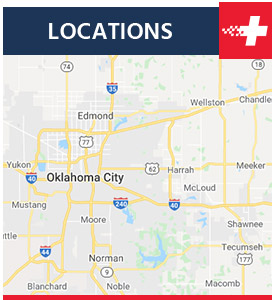Cold vs. Flu: What’s the Difference?
Preventing the cold and flu revolves around several key practices aimed at reducing the spread of these viruses. Simple and effective measures include staying home when sick, avoiding close contact with those who are infected, and maintaining excellent hygiene. At Immediate Care of Oklahoma, Dr. Kevin Penwell (D.O.), and his team offer medical treatment for non-life-threatening illnesses like colds and flu. We are committed to diagnosing your condition accurately and recommending the appropriate treatment options to help you recover quickly. To learn more, contact us or schedule an appointment online. We have convenient locations to serve in Oklahoma City, OK.


Table of Contents:
What is the difference between cold and flu?
Can you have a cold and the flu at the same time?
Can the flu lead to other illnesses?
How can you prevent getting a cold and the flu?
Cold and flu, while sharing similarities in their symptom presentation, are distinct in several key aspects. The cold is primarily an infection that affects the sinuses, nose, throat, or windpipe, often resolving itself within a week to ten days without a cure.
On the other hand, the flu is caused by the influenza virus. Colds are capable of being triggered by a variety of viruses. Although both illnesses impact the upper respiratory system and are prevalent during colder months, their symptom presentations have notable differences.
For instance, fever and chills are more commonly associated with the flu, particularly among adults. Additionally, the flu tends to exhibit more severe symptoms overall, as well as a number of symptoms not typically associated with colds, including body aches.
Given their overlapping symptoms, it’s challenging for individuals to differentiate between the two without a professional diagnosis, which is why seeking assistance from healthcare providers like Immediate Care of Oklahoma helps with prompt diagnosis and relief.
Despite both conditions being highly contagious and affecting the upper respiratory system, the ways in which they present and progress can significantly vary. A key distinguishing factor is the presence of a runny or stuffy nose, more typical in colds, whereas symptoms like diarrhea, vomiting, or nausea suggest the flu.
The virus also spreads in similar ways including touching contaminated surfaces and inhaling virus-containing droplets. Visiting healthcare facilities like Immediate Care of Oklahoma for accurate diagnosis and management helps ensure individuals receive the appropriate care for their specific condition.
It is possible for someone to be afflicted with both the cold and flu concurrently, however, it is highly unlikely. Research indicates that the viruses responsible for these conditions can interfere with each other’s activity, potentially delaying or preventing the onset of one when already infected with the other.
This interaction between the viruses is thought to lead to the low likelihood of co-infection. However, it remains a possibility, particularly given the variety of viruses that cause colds and the various strains of influenza circulating each year. Despite the potential for such rare occurrences, a cold cannot transform into the flu, instead, these would be separate infections. What is more likely is for the flu to lead to the onset of different health conditions. Or for the symptoms of either the flu or a cold to linger longer than their typical duration.
The flu can lead to a number of other illnesses. Its ability to cause more serious complications, especially among individuals with pre-existing health issues or weakened immune systems, is one reason seeking care for the condition is recommended.
Vulnerable groups include the elderly, infants, pregnant women, and those with chronic conditions such as diabetes, heart disease, and respiratory illnesses. The flu can lead to conditions like pneumonia, sinus and ear infections, and can exacerbate existing chronic diseases, sometimes resulting in hospitalization or severe health outcomes.
It’s important to stay up-to-date on flu shots, which are tailored annually to counteract the year’s prevalent influenza strains. Immunizations play a pivotal role in not only protecting individuals from the flu but also in mitigating the risk of severe complications.
This works to improve individual health outcomes, minimize symptoms, and reduce the overall impact on healthcare resources, and ensure that those most at risk have access to necessary care.
Preventing the cold and flu revolves around several key practices aimed at reducing the spread of these viruses. Simple and effective measures include staying home when sick, avoiding close contact with those who are infected, and maintaining excellent hygiene.
Additionally, covering the mouth and nose when coughing or sneezing is critical to prevent the dissemination of germs. While there is no vaccine for the common cold due to the wide range of viruses responsible for its onset, the flu vaccine plays a crucial role in preventing influenza or diminishing the severity of symptoms should infection occur.
Given the flu’s ability to change seasonally and annually, keeping up with annual flu shots is recommended, particularly for those at higher risk of complications.
Cold and flu healthcare services are available at Immediate Care of Oklahoma. To learn more, contact us or schedule an appointment online. We have convenient locations to serve you in Oklahoma City, OK. We serve patients from West Moore OK, Norman (HealthPlex) OK, Norman (24th) OK, Edmond OK, Yukon OK, I-240 & Sooner RD OK, Tecumseh OK, Bethany OK, and surrounding areas.


Additional Services You May Need
▸ Urgent Care Services
▸ Illness + Injuries
▸ On Site Lab + X-Ray
▸ Helpful Health
▸ Motor Vehicle Accidents
▸ Drug Testing
▸ MRO
▸ UTI Treatment
▸ Employment Physicals
▸ Workers Comp
▸ Strep Throat Treatment
▸ Pregnancy Testing
▸ Blood Pressure Testing
▸ Urinalysis
▸ Mononucleosis Treatment
▸ Suture Removal
▸ Respiratory Syncytial Virus
▸ OccMed








